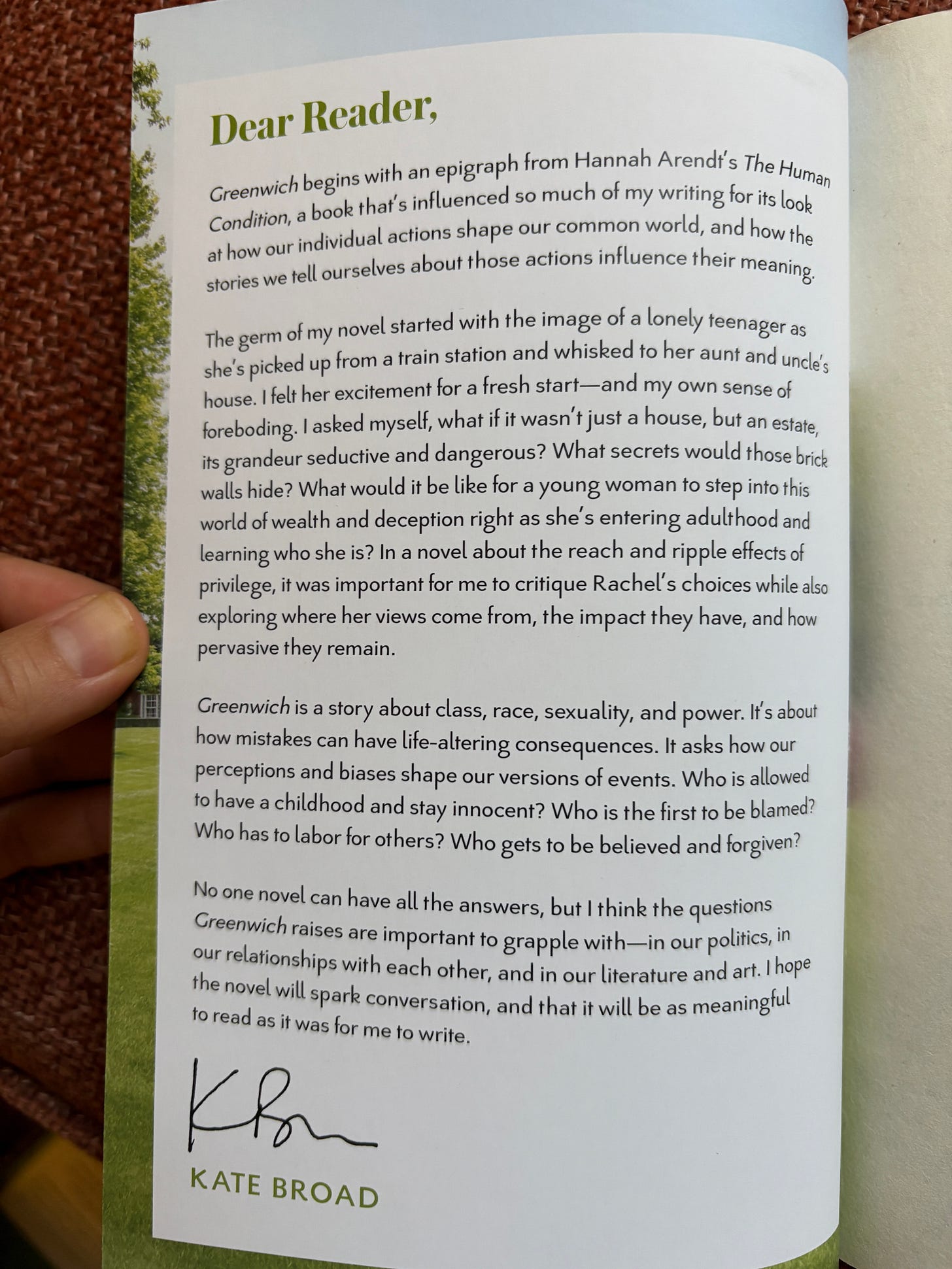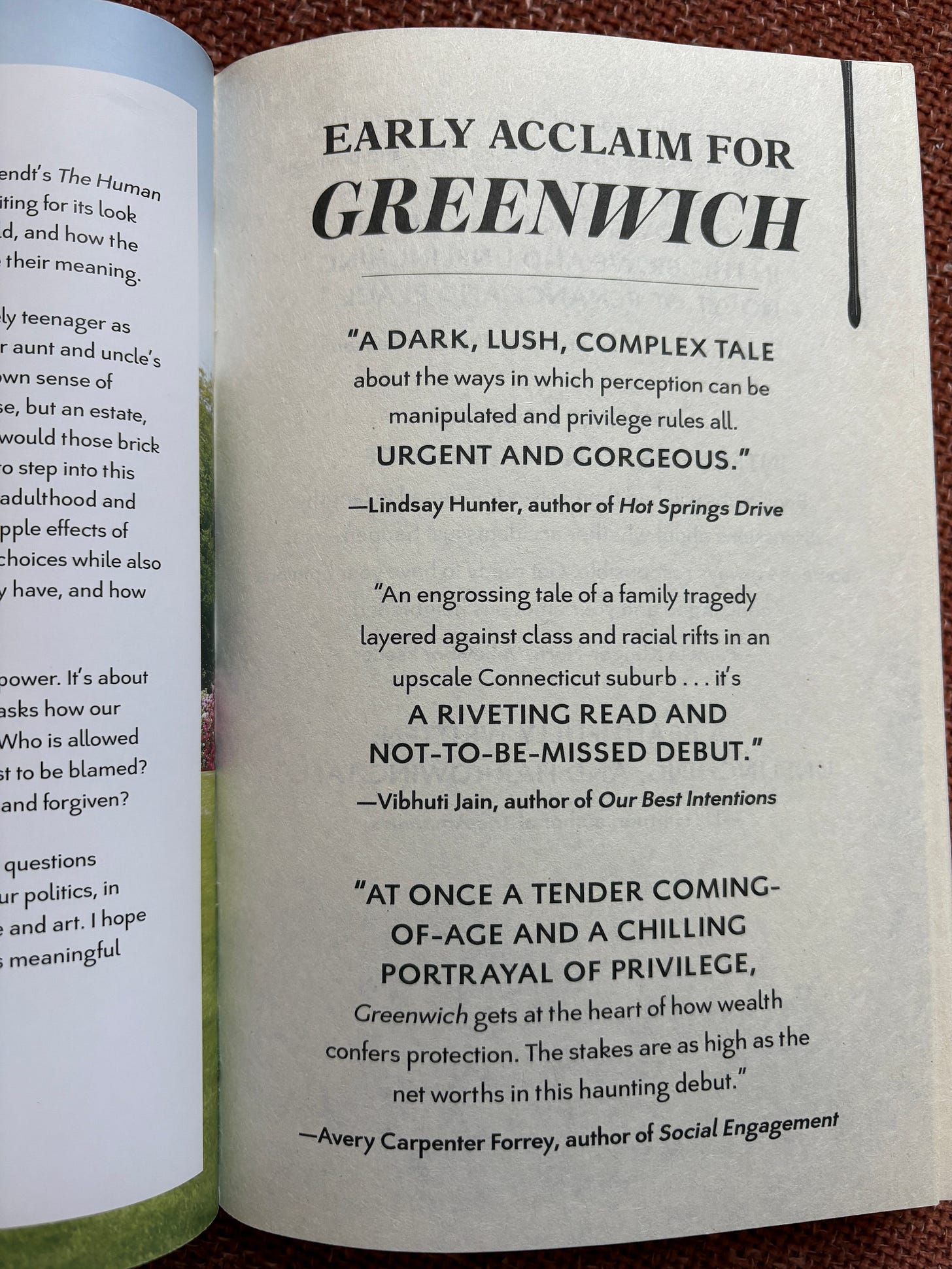Hi, I’m Kate. Ask an Author is a reader-supported newsletter providing advice and support for authors at all stages of writing, publishing, and hand-wringing. If you know someone this applies to, you can forward them this email and encourage them to sign up. Have a question? Fill out this form and I’ll answer it in a future response.
News!
My debut novel Greenwich will be out July 22! Adrienne Brodeur called it “A stunning debut…Fast-paced, beautifully written, vividly peopled… impossible to put down.” Greenwich is one of Publisher’s Weekly’s “buzz books” for summer 2025, and on Zibby Owens’s list of most anticipated new releases this year. Hit that preorder button!
“Care and Feeding” is out in The Rumpus
“Good Dead Girls” is out in No Tokens
And two more pieces are forthcoming — a short story in The Booklyn Review, and an essay in The Bellevue Literary Review.
No new questions in my inbox today! So if you’ve got one, now’s a great time to ask. Also, I’m 97.3% confident that I’ve answered everything in the queue, but if you’ve sent me something and I haven’t answered it yet — please ask again. I’m doing my best to keep up!
With three months to go until GREENWICH is out in the world (July 22!!) and no q’s to answer, this seems like a good time to pull back the curtain and talk about what it’s like leading up to publication.
Every book’s publishing journey is different. I can’t speak to what it’s like with a mid-size or smaller press, or self-publishing. There’s a lot that I don’t even know about what’s happening behind the scenes with my own book. I do know that the biggest thing going on this stage is getting early copies of GREENWICH out to booksellers, librarians, influencers, critics, media people, and early readers. (I love you all!!) This is where ARCs come in.
An ARC is an Advance Reader Copy, also called a galley or a reader’s edition. It’s an early copy that the publisher puts out in order to start gaining traction. GREENWICH will be out in hardcover in July, but the ARC is paperback. It was printed based on an early version of the manuscript, before it went through copyedits and two rounds of proofreading. It’s not the final copy — but it’s the first glimpse I got of something book-shaped and the first time I saw the cover not on a screen. It’s the first time I got to hold something and say “This is my book.”


I shared a picture of my ARCs in an online writing group and got some questions from people who are self-publishing if they need to get ARCs printed, and if so how many, and that’s hard for me to answer because self-publishing is its own industry, and the norms and expectations vary depending on genre. But my general sense is that no, you don’t need printed ARCs, because you aren’t going through the traditional publisher + bookstore + library pipeline. You want to reach your readers directly, and they’re generally going to find you online, so it makes more sense to have digital ARCs instead of going through the hassle and expense of printing. It’s worth learning about how marketing campaigns usually work in your genre so you can find out if e-ARCs are often part of the process and the most popular distribution channels. They aren’t necessary, but it can definitely be helpful to spread the word about your book before it comes out.
Not only are ARCs making their way through the world, but GREENWICH is now available for pre-order.
I had no idea how essential pre-orders are for a book, especially a debut. Here’s what I’ve learned:
The life of a book starts way before release day. Months before a book comes out, publishers start tracking pre-orders to gauge interest and enthusiasm. More pre-orders signal more interest, which tells the publisher to put more resources into a title. Your orders directly impact the publisher’s budget and marketing strategy, which are HUGE determing factors in how a book does.
Pre-orders tell the place you’re pre-ordering from that there’s interest in a title. Even just one pre-order will put it on a bookstore’s radar, and they’re likely to take note of it and order more! In addition to stocking decisions, booksellers are also evaluating things like where the book should be placed (face out? on a display table as you walk in?). There are more books than shelf space, so this is really important.
Pre-orders count toward first week sales. All those orders get added in to determine if a book might hit a bestseller list in the beginning, which gives it a major boost.
The best part about pre-ordering is that if you buy the book now, it ships to you (or appears on your e-reader) right on release day, like a little present to your future self. There’s no chance of forgetting to order, and no waiting around after release day to get your copy. You don’t get charged for the order until it ships, so if finances change between now and then, you can still cancel and get your money back.
All this is to say that pre-orders for GREENWICH are incredibly important, and now is a great time to order! Barnes & Noble is currently running a 25% off sale for its rewards members, which ends TOMORROW. And April 26th is indie bookstore day, where independent bookstores host events to celebrate. Order online, or swing by your favorite indie bookstore, tell them about GREENWICH, and pre-order your copy!
I promise not to make this Substack all about GREENWICH from now until July, but I’m grateful for the opportunity to share a little about the publishing process with you, and to let you know how you can best support the novel.
Thank you for reading my work, for keeping this Substack alive, for pre-ordering GREENWICH, for supporting bookstores, and for being invested in your own writing. If you have questions about this (or any) part of publishing, ask away! My hope is to pay it forward and keep sharing what I’ve learned about how this stuff goes.
Send in your questions, and keep writing!
Kate








